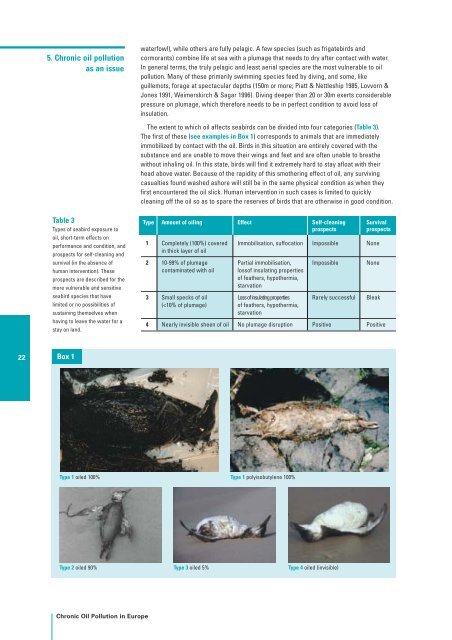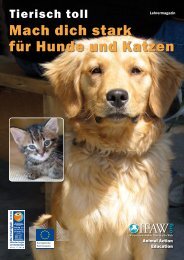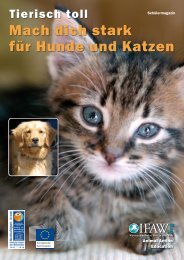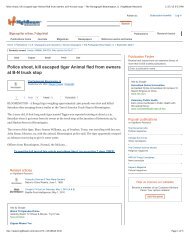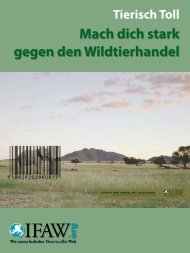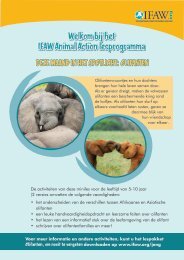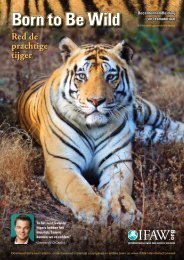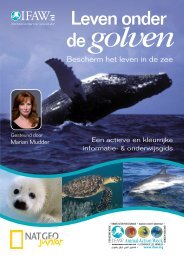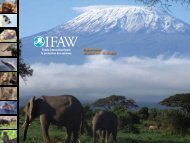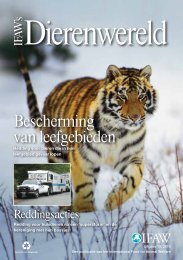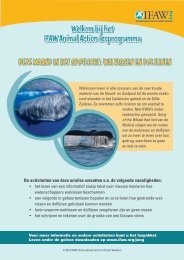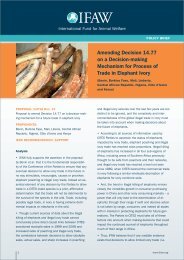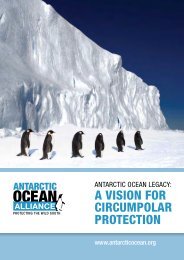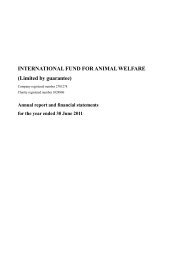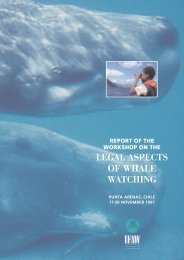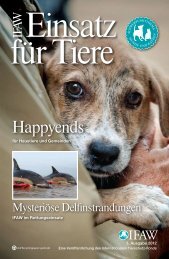Chronic oil pollution in Europe - International Fund for Animal Welfare
Chronic oil pollution in Europe - International Fund for Animal Welfare
Chronic oil pollution in Europe - International Fund for Animal Welfare
You also want an ePaper? Increase the reach of your titles
YUMPU automatically turns print PDFs into web optimized ePapers that Google loves.
22<br />
5. <strong>Chronic</strong> <strong>oil</strong> <strong>pollution</strong><br />
as an issue<br />
Table 3<br />
Types of seabird exposure to<br />
<strong>oil</strong>, short-term effects on<br />
per<strong>for</strong>mance and condition, and<br />
prospects <strong>for</strong> self-clean<strong>in</strong>g and<br />
survival (<strong>in</strong> the absence of<br />
human <strong>in</strong>tervention). These<br />
prospects are described <strong>for</strong> the<br />
more vulnerable and sensitive<br />
seabird species that have<br />
limited or no possibilities of<br />
susta<strong>in</strong><strong>in</strong>g themselves when<br />
hav<strong>in</strong>g to leave the water <strong>for</strong> a<br />
stay on land.<br />
Box 1<br />
Type 1 <strong>oil</strong>ed 100%<br />
<strong>Chronic</strong> Oil Pollution <strong>in</strong> <strong>Europe</strong><br />
waterfowl), while others are fully pelagic. A few species (such as frigatebirds and<br />
cormorants) comb<strong>in</strong>e life at sea with a plumage that needs to dry after contact with water.<br />
In general terms, the truly pelagic and least aerial species are the most vulnerable to <strong>oil</strong><br />
<strong>pollution</strong>. Many of these primarily swimm<strong>in</strong>g species feed by div<strong>in</strong>g, and some, like<br />
guillemots, <strong>for</strong>age at spectacular depths (150m or more; Piatt & Nettleship 1985, Lovvorn &<br />
Jones 1991, Weimerskirch & Sagar 1996). Div<strong>in</strong>g deeper than 20 or 30m exerts considerable<br />
pressure on plumage, which there<strong>for</strong>e needs to be <strong>in</strong> perfect condition to avoid loss of<br />
<strong>in</strong>sulation.<br />
The extent to which <strong>oil</strong> affects seabirds can be divided <strong>in</strong>to four categories (Table 3).<br />
The first of these (see examples <strong>in</strong> Box 1) corresponds to animals that are immediately<br />
immobilized by contact with the <strong>oil</strong>. Birds <strong>in</strong> this situation are entirely covered with the<br />
substance and are unable to move their w<strong>in</strong>gs and feet and are often unable to breathe<br />
without <strong>in</strong>hal<strong>in</strong>g <strong>oil</strong>. In this state, birds will f<strong>in</strong>d it extremely hard to stay afloat with their<br />
head above water. Because of the rapidity of this smother<strong>in</strong>g effect of <strong>oil</strong>, any surviv<strong>in</strong>g<br />
casualties found washed ashore will still be <strong>in</strong> the same physical condition as when they<br />
first encountered the <strong>oil</strong> slick. Human <strong>in</strong>tervention <strong>in</strong> such cases is limited to quickly<br />
clean<strong>in</strong>g off the <strong>oil</strong> so as to spare the reserves of birds that are otherwise <strong>in</strong> good condition.<br />
Type Amount of <strong>oil</strong><strong>in</strong>g Effect Self-clean<strong>in</strong>g Survival<br />
prospects prospects<br />
1 Completely (100%) covered Immobilisation, suffocation Impossible None<br />
<strong>in</strong> thick layer of <strong>oil</strong><br />
2 10-99% of plumage Partial immobilisation, Impossible None<br />
contam<strong>in</strong>ated with <strong>oil</strong> lossof <strong>in</strong>sulat<strong>in</strong>g properties<br />
of feathers, hypothermia,<br />
starvation<br />
3 Small specks of <strong>oil</strong> Loss of <strong>in</strong>sulat<strong>in</strong>g properties Rarely successful Bleak<br />
(


